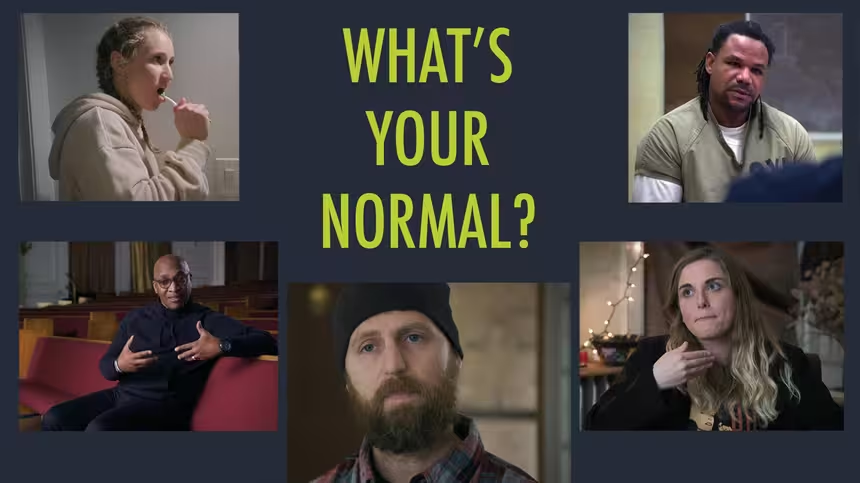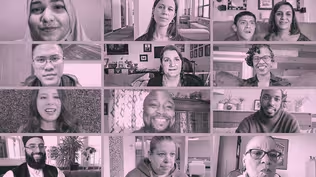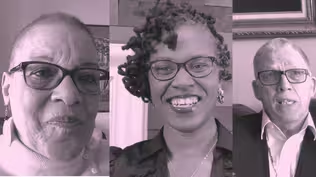
Rosalba Calleros & Alan Alfaro | Decolonizing Mental Health
Special | 5m 22sVideo has Closed Captions
A mother's struggle to find adequate mental healthcare for her son with a disability.
When a mental healthcare facility failed to approach Alan’s bipolar disorder within the context of his cerebral palsy, his mother Rosalba knew the lack lay in the under-resourced, ill-informed discriminatory system. Her resolve to find resources to treat Alan rightly, patiently, and creatively, is an example of hope for other families like theirs. But it requires tenacious and persistent advocacy.
Problems playing video? | Closed Captioning Feedback
Problems playing video? | Closed Captioning Feedback
Funding for Mysteries of Mental Illness is provided by the Corporation for Public Broadcasting, Johnson & Johnson, the American Psychiatric Association Foundation, and Draper, and through the support of PBS...

Rosalba Calleros & Alan Alfaro | Decolonizing Mental Health
Special | 5m 22sVideo has Closed Captions
When a mental healthcare facility failed to approach Alan’s bipolar disorder within the context of his cerebral palsy, his mother Rosalba knew the lack lay in the under-resourced, ill-informed discriminatory system. Her resolve to find resources to treat Alan rightly, patiently, and creatively, is an example of hope for other families like theirs. But it requires tenacious and persistent advocacy.
Problems playing video? | Closed Captioning Feedback
How to Watch Mysteries of Mental Illness
Mysteries of Mental Illness is available to stream on pbs.org and the free PBS App, available on iPhone, Apple TV, Android TV, Android smartphones, Amazon Fire TV, Amazon Fire Tablet, Roku, Samsung Smart TV, and Vizio.

Join the Campaign
Share your story of dealing with mental illness through textual commentary, a still image, a short-form video — however you feel most comfortable — using the hashtag #MentalHealthPBS on social media.(singing in Spanish) These are "The Little Mornings" of which King David used to sing.
For today is your birthday; we sing them to you.
- My birthday.
- My birthday.
- Is May 16th.
- Is May 16th.
- How old are you going to be this May?
- 22.
- 22 - Anything else or should I go?
- You go.
- Okay.
My name is Rosalba Calleros and I'm Alan's mom.
I've been working in Texas Parent to Parent for 11 years.
We are a nonprofit organization and we provide information and support to families who have kids with disabilities.
And you can see that Alan is very proud of that.
He is my first child.
He was born with cerebral palsy.
He is extremely social.
He loves to be around people.
- (concert playing) (singing along) 'Baby, speaking Spanglish...' Well, a couple of years ago, something happened.
And his personality changed completely.
We didn't have any signs of why he was behaving that way.
So we started exploring mental health.
After having a child with cerebral palsy for 19 years, I was pretty good on following up with all his treatments, whatever they were.
But I had no clue what to do with mental health.
Because of the work that I do, I always refer people to their local mental health authority, and they did an assessment on him.
I don't think that they adapted the assessment to his needs because obviously before the mental health issues, he has a developmental disability.
And they were not asking the right questions.
They were asking questions like, "Okay, when you're feeling this way, do you feel the impulse of buying stuff or driving fast, or maybe crossing the street without paying attention?"
Like, he uses a wheelchair for mobility.
He's not going to do anything of that.
And he was given the diagnosis of bipolar.
He was very edgy.
And with those kinds of questions, they lost him, completely.
He had an incident there that was very dramatic where he started like destroying things at the office.
And basically I was walked outside with my child.
He did some damage with his power chair on a car in the parking lot.
I was totally ashamed at the end.
I realized that it was the nurse's car; The one that walked me out.
I'm sorry, I wasn't supposed to be laughing at that-- - I'm sorry.
Good.
I mean, it's not good, but you were not yourself.
You would never do something like that in your right mind, right?
Yeah.
He knows really good the difference between good and bad.
And he's an awesome guy.
I was so lost.
I was just desperate for help.
I think that they didn't have the resources.
They didn't have the training.
They didn't know how to treat my child.
Probably they felt lost, the same way that we were feeling lost.
They need to have better training and better knowledge of developmental disabilities and a better way to communicate with them.
He understands and he's bilingual.
But you need to be patient and creative on talking to people with developmental disabilities.
You can't just go to, "Oh, let's see how it works."
Because it's not going to work.
You need to get training.
You need to get the tools.
I had a very awesome network of support at work.
But what about if I didn't have them?
Probably I will be completely lost right now.
- There he goes!
(laughter and cheers) Having a child with a disability comes with many challenges.
This is another one.
But with the right support, we can go through this.
Agree?
Yes, ma'am.
- Yes, ma'am.
(laughs) I'm sorry for the dog.
Get down.
(laughter)

- Science and Nature

Explore scientific discoveries on television's most acclaimed science documentary series.

- Science and Nature

Capturing the splendor of the natural world, from the African plains to the Antarctic ice.












Support for PBS provided by:
Funding for Mysteries of Mental Illness is provided by the Corporation for Public Broadcasting, Johnson & Johnson, the American Psychiatric Association Foundation, and Draper, and through the support of PBS...

